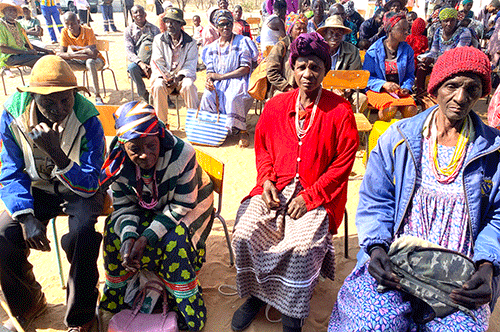Cabinet had directed the ministry of home affairs to address the issue of undocumented and stateless persons in the country in 2021.
Although the ministry ambitiously set sights on realising this target and resolving the problem by 2025, eradicating statelessness within the set timeframe is a mirage, the ministry has conceded.
The executive director of the ministry, Etienne Maritz, told New Era that ending statelessness is not a one-day job.
However, they are on the journey towards addressing the scourge that has had Namibians scratching their heads.
Stateless people are those who do not have citizenship in any country, while undocumented people lack legal documentation to prove their identity and citizenship.
“It is a journey that has various steps. The Harambee Prosperity Plan (HHP II) has detailed the implementation plan under the social progression pillar, and we are operating under that plan to realise the dream,” he said.
All activities planned in the HPP II in this regard have commenced.
The United Nations High Commissioner for Refugees (UNHCR) states that both groups (stateless and undocumented), often belonging to the minority in society, are deprived of human rights and access to basic services.
This leaves them “politically and economically marginalised, and vulnerable to discrimination, exploitation and abuse”.
Currently, Namibia does not have a law that recognises this demographic.
Maritz’s admission comes at a time when minors, purportedly from Angola, roam the streets of Windhoek and other major towns in sheer destitution.
Statistics
The UNHCR said at least 4.4 million people in 95 countries are stateless.
The actual figure globally is believed to be significantly higher, given the relative invisibility of stateless people in national statistical exercises.
Here, a total of 141 048 people registered themselves with local authority offices countrywide as being stateless or undocumented.
However, the ministry said these specific figures are not validated.
Since the commencement of the national mass registration process in March 2024, the ministry has registered 2 607 stateless or undocumented persons.
The recent figure from the ministry indicates the Zambezi region leads the pack with 589.
They are followed by Khomas with 578, Erongo with 321, Hardap with 237, Kavango East with 188, Kunene with 169, Otjozondjupa with 154, Ohangwena with 126, Omusati with 90 and Oshikoto with 58.
Kavango West, Kharas, Omaheke and Oshana have 36, 30, 27 and four people, respectively.
Migration
Khomas’ ranking has been attributed to rural-urban migration, according to governor Laura McLeod-Katjirua.
She said the influx of people, particularly in Windhoek, has left the city grappling with the issue.
“The migrants fall into various categories. We have a group from Kunene, which came during the Covid-19 pandemic, whom we have placed at the National Youth Multipurpose Centre and the Khomasdal Stadium, as well as the latest arrivals from Angola,” she stated.
The region has established a regional committee, chaired by McLeod-Katjirua, which includes members from the City of Windhoek and the regional council, to address the scourge.
The committee collaborates with other stakeholders such as the ministry of home affairs, the ministry of education, the ministry of gender equality and the City Police.
The identified stakeholders have completed and submitted an investigation report to identify stateless and undocumented people, as well as to understand their livelihoods.
Following the report’s submission, the committee has drafted an action plan.
The team will meet next week to finalise and endorse the action plan, which will then be submitted to the upper levels of government.
“We want to submit something that we have coordinated as a region. Our intention is to seek assistance because this issue involves land and financial resources. For example, the homeless people we have placed at the two venues can only be relocated if we have available land. These are the problems we are facing,” stressed the governor.
Successes
However, not all is doom and gloom in Namibia’s fight to eradicate statelessness.
Recounting successes since they began addressing it, Maritz said the commencement of legislation to regularise the status of stateless and undocumented persons stands head and shoulders above the rest as one of their proudest moments.
“This showcases the government’s commitment to inclusivity and legal recognition. Without enabling legislation, the ministry would be acting outside the law, which is not permissible,” the seasoned executive said.
He then appealed to the affected people to bear with them in the process.
Collaborative initiatives between local, regional and national structures to register undocumented individuals, including those who are stateless, signify a concerted effort towards addressing the issue at multiple levels of governance.
“This collaborative approach enhances the effectiveness of registration efforts, and facilitates the integration of marginalised populations into society,” he noted.
He also mentioned outreach programmes as one of the achievements of the ministry’s intensified mobile birth and ID registration outreach programmes in remote areas.
Challenges
While progress has been recorded, it has not been without challenges.
Chiefly, there is a lack of clarity and understanding of what statelessness and undocumented status mean.
“This has resulted in people registering themselves incorrectly, potentially inflating the reported numbers, and hindering accurate identification of those truly in need of assistance,” he said.
Potential misidentification also poses another headache for the ministry.
“People who do not meet the criteria for statelessness or undocumented status may inadvertently register themselves as such,” said Maritz, adding that it might lead to inaccurately assessing the extent of the issue and effectively targeting it.
The legislation to regularise the status of stateless and undocumented persons has commenced.
Such legislation is the Namibian Citizenship Amendment Bill, the Regularisation of the Status of Certain Residents of Namibia and Their Descendants’ Bill, and the Statelessness Determination and Protection Bill.


